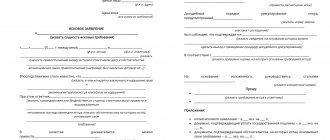Grounds for recognition as an unworthy heir
You need to challenge the right of claim of another heir and recognize him as an unworthy heir . But for this there must be rules of inheritance provided for by law:
- Deliberately and illegally contributed to or committed an inheritance contrary to the will of the deceased ( committed a crime against the testator),
- Deliberately and illegally wanted to increase the part of the inheritance that they would have received, or did so,
- If parents are deprived of rights in relation to children,
- Draft dodgers, that is, those who did not fulfill their obligations under the law (most often alimony, both for children and parents).
These are the grounds on which you can recognize the heir as unworthy. What is the order?
Unworthy heir from the point of view of the law
The legal interpretation of the term “unworthy heir” does not coincide with the opinion of society. For the most part, people interpret this concept too broadly, including personal relationships between the heir and the testator, the behavior of the successor, and much more. The law has a specific and unambiguous meaning.
A citizen has no right to claim an inheritance if:
- he committed actions (inaction) that significantly violated the rights of the testator and co-heirs, as a result of which his share increased;
- he refused to fulfill certain duties assigned to him by virtue of the requirements of the law or a court decision.
The above circumstances are clearly defined in the Civil Code. It is on their basis that the successor of the deceased is considered unworthy.
Recognition of an heir as unworthy through court
In order for you to be able to recognize your relative as an unworthy heir , you need to go to court , since no other methods are provided. To do this, you will need to leave a corresponding statement in which you describe all the circumstances. For example,
- the heir committed a number of actions that led to the fact that he received all the inherited property.
- Namely, he did not inform the notary that you are also an heir and you are entitled to ½ share in the inheritance.
- At the same time, he told you that he would not formalize the inheritance, but he did the opposite.
- It is also possible that through the actions of such an heir, the death of the testator occurred through the fault of the heir, who caused serious harm to his health.
- Or he brought to the notary a forged refusal of inheritance , which you allegedly drew up.
- You must indicate these circumstances in your application.
The evidence will be a verdict against such an heir, by whom he was brought to criminal liability, a court decision on deprivation of parental rights, on the collection of alimony for the maintenance of children or parents. These documents are attached to the claim and submitted to the court.
Judicial practice in cases of unworthy heirs
In the vast majority of cases, cases of declaring an heir unworthy do not reach the court, since they are successfully resolved by a notary upon presentation of evidence. But in exceptional situations, worthy successors still have to turn to the judiciary. As a rule, claims are brought in cases where:
- the unworthy heir managed to enter into the inheritance because the notary was not notified in a timely manner about the circumstances that prevented the issuance of a Certificate to him;
- the heir must be recognized as unworthy based on the facts specified in Part 2 of Article 1117 of the Civil Code of the Russian Federation - malicious evasion of payment of maintenance to the testator;
- the notary rejected the application to recognize the heir as unworthy;
- interested parties do not have significant evidence and the possibility of obtaining it otherwise than through the judicial authorities.
When analyzing judicial practice, we can come to the conclusion that most claims remain unsatisfied, since the evidence base is insufficient to recognize the heir as unworthy.
Due to frequent updates to legislation and the legal uniqueness of each situation, we recommend obtaining a free telephone consultation with a lawyer. You can ask your question by calling the hotline number 8 (800) 555-40-36 or write it in the form below.
Requirements in court
At the trial, it is worth involving a notary in the case as a third party, who will confirm the fact that the defendant did not inform him about the existence of other heirs. As requirements , in addition to recognition as an unworthy heir , you will also need to indicate (depending on the stage of the inheritance case) other requirements:
- On invalidating a certificate of inheritance
- On termination of ownership of inherited property
- On recognition of the ownership of the inheritance as yours.
This inheritance dispute will be fierce, so prepare carefully for it, collect all the evidence, find witnesses, and defend your position in court. If you have the above documents, the court will rule in your favor.
In _____________________________ (name of the court) Plaintiff: _________________________ (full name, address) Defendant: ______________________ (full name, address) Cost of the claim: ______________________ (full amount of the claims)
STATEMENT OF CLAIM
on recognition as an unworthy heir
“___”_________ ____ died ____________ (full name of the deceased). After his death, an inheritance was opened consisting of _________ (indicate the composition of the inherited property).
I am the heir of ___ (queue of succession) after the death of _________ (full name of the deceased) on the basis of _________ (indicate the grounds for inheritance, by law or will).
The defendant is the heir of ___ (inheritance line) on the basis of _________ (indicate the grounds for inheritance, by law or by will). The defendant is an unworthy heir because _________ (indicate the reasons why the defendant is an unworthy heir).
In accordance with Article 1117 of the Civil Code of the Russian Federation, citizens who, by their deliberate unlawful actions directed against the testator, any of his heirs or against the implementation of the testator’s last will expressed in the will, contributed or tried to contribute, do not inherit either by law or by will. calling them or other persons to inherit, or contributed or attempted to promote an increase in the share of the inheritance due to them or other persons, if these circumstances are confirmed in court. However, citizens to whom the testator bequeathed property after they lost the right to inherit have the right to inherit this property. Parents do not inherit by law after children in respect of whom the parents were deprived of parental rights in court and were not restored to these rights by the day the inheritance was opened. At the request of an interested person, the court excludes from inheritance according to the law citizens who have maliciously evaded the fulfillment of their obligations under the law to support the testator.
Circumstances indicating that _________ (full name of the defendant) maliciously avoided fulfilling his duties to support _________ (full name of the deceased) can be confirmed by witnesses _________ (full full name and address).
Based on the above, guided by Articles 131-132 of the Civil Procedure Code of the Russian Federation,
Ask:
- Recognize _________ (full name of the defendant) as an unworthy heir.
- To exclude _________ (full name of the defendant) from inheritance by law after the death of _________ (full name of the testator, date of death).
Petition:
I request the following to be summoned to court as witnesses: _________ (full name, full address).
List of documents attached to the application (copies according to the number of persons participating in the case):
- Copy of the statement of claim
- Document confirming payment of state duty
- Death certificate of the testator
- Documents confirming the right of inheritance
- Documents confirming the existence of inherited property
- Documents confirming that the defendant is an unworthy heir
Date of application “___”_________ ____ Signature of the plaintiff ___________
How to recognize an unworthy heir in practice
A client whose father died and also had a brother turned to a lawyer for help. When the inheritance case opened , the brother decided that he should inherit all the property (apartment and dacha). At the same time, alimony was collected from him for the maintenance of their father, which he did not pay during his lifetime, as a result of which a debt arose.
During the consultation, he asked what actions could be taken to remove his brother from inheritance. It was proposed to recognize the brother as an unworthy heir on the grounds that he maliciously did not fulfill his duties to help his father.
- A lawsuit was prepared
- a court decision on the collection of alimony is attached,
- certificate of arrears of alimony.
In court, the defendant was unable to counter our arguments with anything, and the court declared him an unworthy heir and excluded him from inheriting property altogether.
Who can file a claim
In accordance with the Supreme Court Resolution No. 9 (clause 20), a claim to declare an heir unworthy can be filed by the following persons:
- Interested in inheritance.
- Heirs whose share may increase due to recognition as unworthy.
- Heirs receiving a share due to the refusal of another person.
- Persons whose rights may be affected in the event of the transfer of property to a potentially unworthy heir.
- Heirs whose rights to property arise if the heir is found unworthy.
In which court should the claim be filed?
The choice of judicial authority depends on a number of circumstances. You can contact the defendant’s place of residence. In the absence of information regarding the residence of the defendant, the claim is filed at the location of the estate.
Recommended reading: When a will is read out after death
An incorrect choice of the court branch, an insufficiently prepared evidence base, or the absence of a receipt for payment of the state duty may become reasons for refusing to satisfy the plaintiff’s request.
Procedure and rules for filing a claim
- Prepare evidence that the heir is unworthy. They must be compelling and not open to ambiguity. This could be either surveys of neighbors, or filmed videos or recordings of conversations.
- Write a statement of claim (see description and sample below).
- Pay the state fee.
- File a claim in court.
- Get a court decision.
- Wait until it comes into force (usually a month after issuance to the plaintiff).
- Send the decision to the notary involved in the inheritance matter. On its basis, the unworthy heir will be excluded from the lists.
How to divide the inheritance after identifying an unworthy heir
Division in the presence of a will in which an unworthy person appears
- A will for all property in favor of one all-heir (disqualified). In fact, the will becomes unexecutable. All applicants inherit on the basis of the law in order of priority, which is established according to the degree of relationship to the testator.
- Only part of the property is bequeathed; the will specifies one heir (unworthy). This part of the inheritance property is also released from the terms of the will and goes to the general inheritance mass for division according to the law.
- All property is bequeathed; Several co-heirs were named, including the undeserving one. The estate asset is divided only among the persons named in the will, minus the absent beneficiary.
- A separate thing from the inheritance mass is bequeathed; the will names several successors along with the disinherited one. This specific thing (car, real estate, deposit, etc.) is redistributed among those indicated in the will. The rest of the property is in the general order, without the participation of those deprived of inheritance powers.
Distribution of inheritance in the absence of a will
The removed person is an all-heir (the only representative in his line of heirs). This queue is considered empty (without applicants). The inheritance is accepted by the successors of the next line (in descending order). Let's say the unworthy one was the first-priority successor. After its exclusion, the second line is called upon to inherit.
The unworthy person is one of several priority co-heirs (the line that is called to inherit). The order of inheritance does not change (that is, subsequent relatives (lower in line) are not called upon to participate in the division of property), however, the inheritance shares of the participants in the current line increase due to the departure of an undeserving relative.
Who can be included in the category of unworthy heirs?
According to the laws of the Russian Federation, the resolution of the plenum, unworthy heirs are:
- Parents who did not take part in the development, upbringing, care, and material support of children;
- Persons who harmed the health or life of the testator;
- Citizens forced to draw up a will;
- Those who neglected the care required by law.
A citizen must be a contender for inheritance by law or will.





